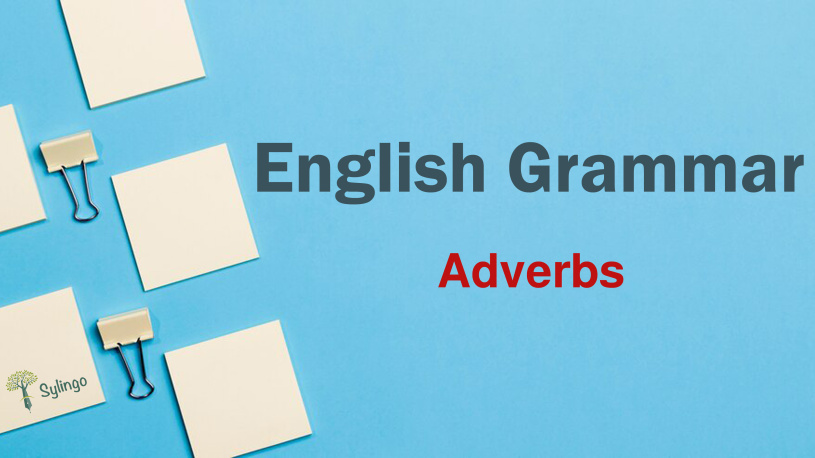An adverb is used to modify verbs, adjectives, or other adverbs in a sentence or to explain additional information. There are several types of adverbs in the English language. We will learn in this lesson about adverbs and how to use them.
Adverbs forming
1- The general rule in adverbs forming is by adding (ly) to the end of a word, but there are some exceptions.
Examples:
|
Nouns |
Adverbs |
|
Slow |
Slowly |
|
Quick |
Quickly |
|
Clear |
Clearly |
|
Quiet |
Quietly |
2- When the word ends with the letter (e), we replace it with (ly).
Examples:
|
Nouns |
Adverbs |
|
True |
Truly |
|
Possible |
Possibly |
But there are some exceptions, such as:
|
Active |
Actively |
|
Polite |
Politely |
3- When the word ends with the letter (y), we replace it with the letter i, and then we add (ly).
Examples:
|
Nouns |
Adverbs |
|
Happy |
Happily |
|
Easy |
Easily |
But there are some exceptions, such as:
|
Shy |
Shyly |
|
Dry |
Dryly |
4- If the word ends with the letters (ic), we add (ally) to the end of it.
Examples:
|
Nouns |
Adverbs |
|
Fanatic |
Fanatically |
|
Basic |
Basically |
But there is an exception to this rule:
|
Public |
Publicly |
5- If the word ends with a double (l), we only add the letter (y) to the end of it.
Examples:
|
Nouns |
Adverbs |
|
Full |
Fully |
6- In some cases, the words do not change and stay the same, so we do not add suffixes or prefixes.
Examples:
|
Nouns |
Adverbs |
|
Fast |
Fast |
|
Hard |
Hard |
|
Late |
Late |
|
Early |
Early |
Note:
The word (Hardly) is not derived from the word (Hard). It is a different adverb that means barely or rarely.
7- Some words completely change when forming adverbs.
Examples:
|
Nouns |
Adverbs |
|
Good |
Well |
Adverbs types
1- Adverbs of manner:
They explain how the action occurs, and come after the direct object or the verb if there is no object in a sentence, such as:
|
Randomly |
|
Weirdly |
|
Lightly |
Examples:
|
The teacher speaks fluently. |
|
He runs fast. |
|
I drive the car carefully. |
2- Adverbs of time:
They tell us when the action takes place, and come at the beginning of a sentence or the end of it, such as:
|
Now |
|
Early |
|
Tomorrow |
Examples:
|
He came very late. |
|
I did my homework yesterday. |
|
Recently, they visited us. |
3- Adverbs of place:
They tell us where the action takes place, and come after the direct object or the verb if there is no object in a sentence, such as
|
Here |
|
Inside |
|
Above |
Note:
It may be hard to distinguish between some adverbs of place and prepositions in English because of the similarity. We can differ between them, as the adverbs modify verbs, while prepositions describe nouns and are followed by an object.
Examples:
|
I work there. |
|
Let us go outside to have dinner. |
|
You can go anywhere in the city. |
4- Adverbs of degree
They express the intensity of something, and come before the described word or after it in specific cases, such as
|
Almost |
|
Enough |
|
A bit |
|
too |
Examples:
|
I am so happy. |
|
He is very busy. |
|
We don’t talk to him at all. |
|
Everything is absolutely perfect. |
5- Adverbs of frequency
They show how often we do something, and come before the main verb in a sentence, except the verb (to be) because they come after it.
We use adverbs of frequency with the present simple tense to express routine activities, such as
|
Always |
|
Every (hour, day, week...) |
|
Frequently |
|
Usually |
|
Normally |
|
Often |
|
Sometimes |
|
Occasionally |
|
Rarely |
|
Seldom |
|
Never |
Note:
Adverbs such as (occasionally, sometimes, often, frequently, and usually) can come at the beginning of a sentence or at the end.
Examples:
|
I always visit my grandmother. |
|
He is usually late for work. |
|
Sometimes, they go on vacation. |
|
We see them rarely. |
That is all you need to know about adverbs and their uses. If you have any questions or suggestions, you can share them in the comments section below.
Exercise
Form adverbs from the following words.
1- Casual
2- Slow
3- Sudden
4- Early
5- Happy
6- Beautiful
7- Busy
8- Incredible
9- Academic
10- Low
Answers
1- Casually
2- Slowly
3- Suddenly
4- Early
5- Happily
6- Beautifully
7- Busily
8- Incredibly
9- Academically
10- Low





